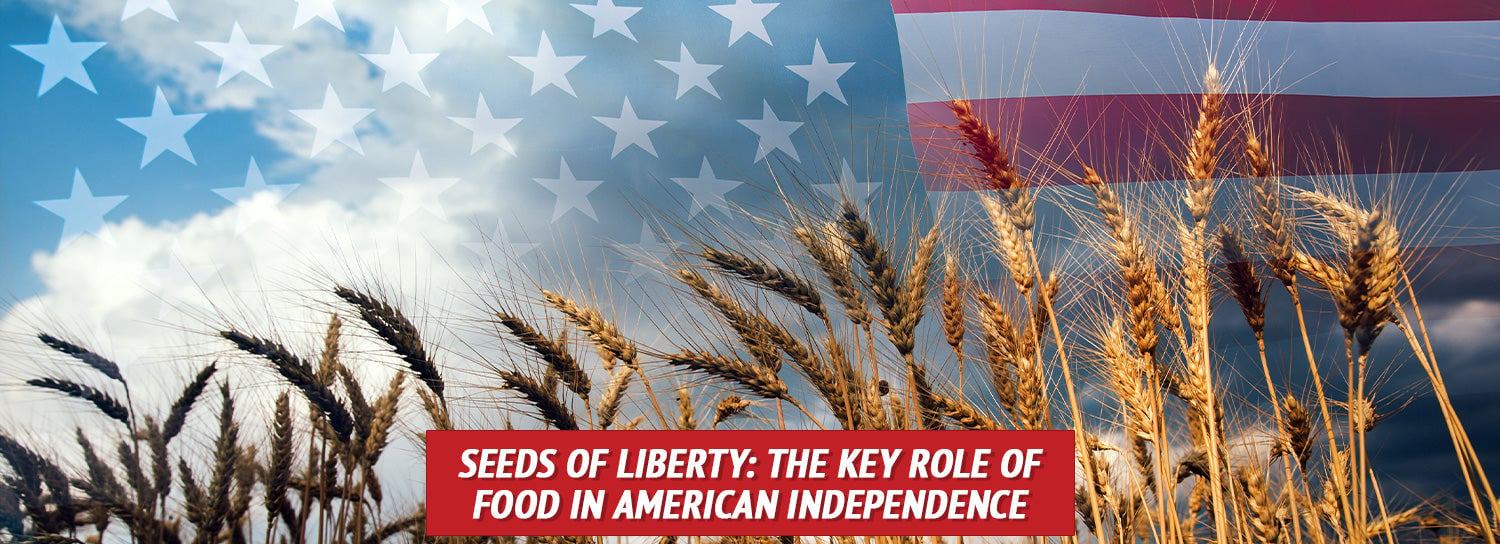
It can be argued that America’s independence comes from food.
Without the ability to grow, harvest, store, and preserve food, America would not have gained its independence from Britain.
Quartz explains, “Food production became a key determinant of American independence, with seeds serving as the organic capsules containing the roots of liberty and the means by which British goods could be successfully boycotted. Seeds represented autonomy. They were independence.”
The ability to continue to keep families fed during times of war and struggle without imports is one of the things that sets apart Americans – we are an independent and resilient nation.
Founding Father Benjamin Franklin said, “There seem to be but three ways for a nation to acquire wealth. The first is by war, as the Romans did, in plundering their conquered neighbors. This is robbery. The second by commerce, which is generally cheating. The third by agriculture, the only honest way, wherein man receives a real increase of the seed thrown into the ground, in a kind of continual miracle, wrought by the hand of God in his favor, as a reward for his innocent life and his virtuous industry.”
As you head into your 4th of July celebrations, take time to remember the following examples of America’s food resiliency and independence.
During The Revolutionary War
It was during the Revolutionary War that the Declaration of Independence was signed on July 4, 1776. However, the war didn’t end with the signing of this important document. The new nation had to establish independence, and one way they were able to during the Revolutionary War was through food.
As Tom Standage writes in An Edible History of Humanity [quoted in Smithsonian Magazine], “In theory, the British should easily have been able to put down the rebellion among their American colonists. Britain was the greatest military and naval power of its day, presiding over a vast empire. In practice, however, supplying an army of tens of thousands of men operating some three thousand miles away posed enormous difficulties. The British failure to provide adequate food supplies to its troops was not the only cause of its defeat, and of America’s subsequent independence. But it was a very significant one.”
American troops defeated the British because they had food from local farms while the British ran out of provisions.
Additionally, they rationed food to ensure American soldiers had enough food to maintain their energy on the battlefield.
During the Civil War
Similar to the Revolutionary War, soldiers lived off rations, such as hard tack.
While they were away on the battlefields, the wives and children were left to take over the farm work.
Unfortunately, it was much harder with the men missing from family farms. This led to less food for those left at home.
But the women didn’t give up! They were resilient. They found food substitutions and ways to stretch meals.
According to NCpedia, “An April 1863 article in a Greensboro newspaper, for example, explained that okra seeds could replace coffee beans, if ‘carefully parched and the coffee made in the usual way, when we found it almost exactly like coffee in color, very pleasantly tasted and entirely agreeable.’ Mary Grierson, of Cabarrus County, in her memoir How We Lived during the Confederate War, listed wheat, rye, and sweet potatoes as substitutes for coffee. She also wrote that molasses cane ‘was crushed with wooden rollers by horse power and the juice boiled in wash pots… [and]... was used instead of sugar – we called it long sweetening.’”
During the Great Depression
During the Great Depression, Americans showed their resilience time and time again – especially when it came to feeding their families.
It became imperative to know how to hunt, fish, forage, and grow your own food.
Families had their own gardens, which enabled them to be independent rather than dependent on grocery stores.
You can get started growing your own food with a Survival Seed Vault. This seed vault contains 21 varieties of USDA Certified Organic Heirloom Seeds, which can last 5+ years in proper storage.
Our grandparents didn’t stop with simply growing their own food. They reused and repurposed. They stocked up when they could.
They recognized that emergencies could happen anytime, which is why we encourage families to be prepared and have emergency food stockpiled.
During WWII

During WWII, American consumers had to live with rationing, which meant those at home had to learn to make do with what they had.
It was also during WWII that the US launched a “Food for Victory” campaign, which encouraged citizens to eat leftovers and grow their own produce.
These homegrown gardens became known as Victory Gardens and were a way to show patriotism.
According to the History Channel, “By 1945, some 20 million such gardens were in use and accounted for about 40 percent of all vegetables consumed in the U.S.” Like those before them, they also made a point to preserve their food.
American independence and resilience require growing your own food, so you won’t be reliant on grocery stores or the government. Now is the time to invest in the Patriot Seeds Survival Seed Vault.
Stay Independent and Resilient
Let us learn from the brave American men and women who came before us.
Prioritizing food is essential to survival, and as history shows, producing and stockpiling your own is key.
- Grow your own food. Ensure you always have food by learning how to grow your own food. Stock up on sprouting seeds.
- Learn to hunt. If you know how to hunt, you’ll never run out of food.
- Know how to preserve food. Learning how to can, freeze, and other methods for preservation is a worthwhile endeavor.
- Like rationing, it is wise to invest in an emergency long-term food supply.
From all of us here at My Patriot Supply – Happy Fourth of July!
In liberty,
Elizabeth Anderson
Preparedness Advisor, My Patriot Supply


